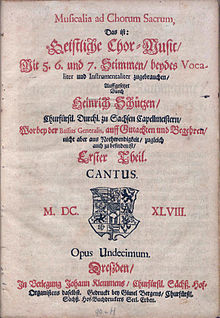Geistliche Chormusik
| Geistliche Chormusik | |
|---|---|
| by Heinrich Schütz | |

Title page of Geistliche Chor-Music, 1648
|
|
| Catalogue | Op. 11, SWV 369 to 397 |
| Genre | Collections of motets |
| Text |
|
| Language | German |
| Dedication | Leipzig, its mayor, council and Thomanerchor |
| Published | 21 April 1648 in Dresden |
| Vocal | 5 to 7 voices |
Geistliche Chormusik (Sacred choral music) is a collection of motets on German texts for choir by Heinrich Schütz. It was printed in Dresden in 1648 as his Opus Undecimum (Op. 11), and comprises 29 individual settings for five to seven voices, which were assigned numbers 369 to 397 in the Schütz-Werke-Verzeichnis (SWV). The original title was Geistliche Chor-Music, Erster Theil which indicates that Schütz planned a second part. It is also known as Geistliche Chor-Music 1648. The collection contains earlier and new works and a German arrangement of a motet by Andrea Gabrieli.
Schütz assembled a collection of 29 motets, which were assigned numbers 369 to 397 in the SWV, in 1648, the year that ended the Thirty Years' War. The original title was Geistliche Chor-Music, Erster Theil which indicates that Schütz planned at least a second part. The collection contains earlier and new works and a German arrangement of a motet by Andrea Gabrieli.
In an extended foreword, Schütz describes the work as examples of composition in counterpoint without basso continuo, following the model of his teacher Giovanni Gabrieli in stile antico, writing: Geistliche Chor-Music / Mit 5. 6. und 7. Stimmen / beydes Vocaliter und Instrumentaliter zugebrauchen / Auffgesetzet / Durch / Heinrich Schützen / ... Worbey der Bassus Generalis auff Gutachten und Begehren / nicht aber aus Nothwendigkeit / zugleich auch zu befinden ist ... (sacred choir music / with 5 6 and 7 voices / to be used both vocally and instrumentally / set / by / Heinrich Schützen / ... the general bass can be used at the same time if liked and wanted / but is not necessary).
Schütz dedicated the collection to Leipzig, addressing the mayor and the town council and mentioning especially the choir, known now as the Thomanerchor. The dedication, dated "Dreßden, am 21. April 1648", is his first not to court and nobility.
...
Wikipedia
